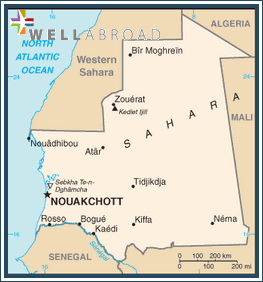|
MOST RECENT ALERTS
There's no recent alert.
|

|
|||||||||||||||
| COUNTRY OVERVIEW | ||||||||||||||||
|---|---|---|---|---|---|---|---|---|---|---|---|---|---|---|---|---|
|
| COUNTRY GENERAL INFORMATION | |||||||
|---|---|---|---|---|---|---|---|
| Language: |
Arabic (official), Pulaar, Soninke, French, Hassaniya, Wolof |
||||||
| Currency: | Mauritanian Ouguiya (MRO) | ||||||
| Predominant Religions: |
Muslim 100% |
||||||
| National Holidays: | Independence Day, 28 November (1960) | ||||||
| Economic Status: |
Mauritania has an estimated 1 billion barrels of proved reserves. Meantime the government emphasizes reduction of poverty, improvement of health and education, and promoting privatization of the economy. |
||||||
| Security: |
Mauritanian has an estimated 1 billion barrels of proved reserves. Meantime the government emphasizes reduction of poverty, improvement of health and education, and promoting privatization of the economy. |
||||||
| US Presence: |
U.S. Embassy in Nouakchott
288, rue 42-100, (rue Abdallaye) BP 222, Nouakchott, Mauritania Phone: 222-4525-2660 or 2663 |
||||||
| Document Requirements: |
A passport and a visa are required, as is evidence of yellow fever vaccination. Mauritanian visas require an invitation or sponsor, can take up to several months to process, and must be obtained prior to travel. Visas are no longer available at border crossings or at the airport upon arrival. Americans who apply for Mauritanian visas are experiencing significant delays, often waiting several months if their applications are approved at all. For the most current visa information, contact the Embassy of the Islamic Republic of Mauritania, 2129 Leroy Place NW, Washington, DC 20008, tel. (202) 232-5700, or the Mauritanian Permanent Mission to the United Nations, 211 East 43rd Street, Suite 2000, New York, NY 10017, telephone (212) 986-7963 or 8189. Overseas, inquiries should be made at the nearest Mauritanian embassy or consulate. The U.S. Embassy in Nouakchott cannot provide assistance to American citizens seeking Mauritanian visas. The U.S. Department of State is unaware of any HIV/AIDS entry restrictions for visitors to or foreign residents of Mauritania. Information about dual nationality or the prevention of international child abduction can be found on our website. For further information about customs regulations, please read our Customs Information page. |
||||||
| Major Airports: |
Airports: 25, Airports w/paved runways: 8 |
||||||
| Servicing Airlines: |
|
||||||
| Risks and Precautions: |
Political stability remains a problem in Mauritania, with a handful of unsuccessful coups attempted between 2003 and 2005. American citizens are urged to avoid travel in areas along Mauritania's border with Algeria, and its northern border with Mali. Travelers should not venture into the Sahara unless accompanied by an experienced guide and even then only if equipped with sturdy vehicles and ample provisions. Americans visiting Mauritania should be prepared for such inquiries and carry their identification cards at all times. U.S. citizens should avoid large crowds and maintain security awareness at all times. Although U.S. citizens are generally welcomed in Mauritania, there were reports of anti-American incidents such as threats and stoning of vehicles. Crime in Mauritania is moderate but steadily increasing. Foreign tourists, including Americans, might be targeted for kidnapping in Mauritania. In Nouakchott, you should avoid the beach at night. During the day, beach-goers should travel in large groups or stay in popular areas. |
||||||
| Mortality Statistics: |
Infant MR total: 68.07 deaths/1,000 live births Life expectancy at birth: TOTAL 53.51 years (male 51.24/female 55.85) |
||||||
| Immunization Indicators: |
Required: Yellow Fever Recommended: Hep A & B, Rabies, Typhoid, Polio |
||||||
| Infectious Disease Concerns: |
degree of risk: very high Malaria risk area in Mauritania: All, except no risk in Dakhlet- Nouadhibou and Tiris-Zemmour region. Dengue, filariasis, leishmaniasis, and onchocerciasis (river blindness) are other diseases carried by insects that also occur in West Africa. African trypanosomiasis (African sleeping sickness) has increased in Africa, and an increase in travelers has been noted since 2000. Schistosomiasis can be contracted in fresh water in this region. Do not swim in fresh water (except in well-chlorinated swimming pools) in these countries. Polio outbreaks were reported in several previously polio-free countries in Central, Eastern, and Western Africa beginning in 2003. Many countries in this region have high incidence rates of tuberculosis and high HIV prevalence rates. |
||||||
| Overall Quality of Medical Services: |
Medical facilities in Mauritania are limited. There are few modern clinics or hospitals beyond the capital and a few major towns. |
||||||
| Providers in Network: |
|
||||||
| Recent Medical Threats/ Concerns/Warnings: |
Highly pathogenic avian influenza (H5N1) has been found in poultry populations in several countries in Africa. Avoid all direct contact with birds, including domestic poultry (such as chickens and ducks) and wild birds, and avoid places such as poultry farms and bird markets where live birds are raised or kept. |
||||||
| Communications Info: |
Country Calling Code: +222 Internet Country Code: .mr |
||||||






